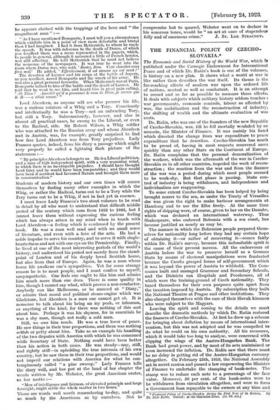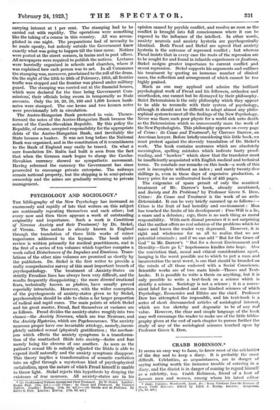The Economic and Social History of the World War, which
is published under the Carnegie Endowment for International Peace and of which Dr. Rain's book is one of the volumes, is history on a new plan. It shows what a world at war is like rather than describes the war itself. Its theme is the far-reaching effects of modem war upon the ordered life of nations, neutral as well as combatant. It is an attempt to record and so far as possible to measure those effects. It deals with subjects which military history seldom touches : war governments, economic controls, labour as affected by war, the mobilization and the reconstruction of industry, the shifting of wealth and the ultimate evaluation of wa: costs.
Dr. Rain, who was one of the founders of the new Republic of Czecho-Slovakia, was, till he fell mortally wouhded by an assassin, the Minister of Finance. It was mainly his hand which directed the change from war expenditure to peace expenditure that he describes. Czecho-Slovakia has much to be proud of, having in most respects recovered more quickly than any other State on the Continent of Europe. Dr. Rain complains that the personal demoralization of the workers, which was the aftermath of the war in Czech°. Slovakia as in all other countries, impeded the work of recon- struction ; the reaction from the war and from the finance of the war was a period during which most people seemed to be work-shy. But that phase is passing. State con- trol of industry is being withdrawn, and independence and individualism are reappearing.
To some extent Czecho-Slovakia has been helped by being brought nearer to the sea, as under the Treaty of Versailles she was given the right to make harbour arrangements at Hamburg and to use the Elbe freely. At the same time rights of shipping were, of course, given to her on the Danube, which was declared an international waterway. Thus Shakespeare, who endowed Bohemia with a sea coast, has become justified as nearly as may be.
The manner in which the Bohemian people prepared them- selves for nationality long before they had any certain hope of obtaining it—or rather of recovering it—comes fairly within Dr. Rain's survey, because this indomitable spirit is the cause of their present success. All the endeavours of Austria before the war to preserve herself as a German State by means of electoral manipulations were frustrated because the Czechs grasped forms of self-government which it was beyond the power of Austria to withhold. The Com- munes built and managed Grammar and Secondary Schools, and the Districts ran Hospitals and Poorhouses, all of which were the training-ground of Czech nationality. They taxed themselves for their own purposes quite apart from the taxation imposed by Austria. By subscription they built the National Theatre at Prague and other institutions. They also charged themselves with the care of their Slovak kinsmen who were subject to the Magyars.
Leaving the spirit and coming to the details we must describe the dramatic methods by which Dr. Rain restored the finances of Czecho-Slovakia At first he drew up a scheme for bringing about deflation by means of international inter- vention, but this was not adopted and he was compelled to do what he could on his own authority. All his measures, which it would take too long to analyse, were concerned with clipping the wings of the Austro-Hungarian Bank. The Bank had great power, and by most of its acts maintained or even increased the inflation. Dr. Rain saw that there must be no delay in getting rid of the Austro-Hungarian currency altogether. On February 25th, 1919, the National Assembly sat in secret session and passed a law empowering the Minister of Finance to undertake the stamping of bank-notes. The stamp was to reduce each note to a percentage of the face value. Moreover, 50 per cent. of the bank-notes were to be withdrawn from circulation altogether, and were to form a Government loan repayable to the owners at any time and • Financial Policy of Cacho-Slovakia during the First Year of Its Hworm. By Dr. Alois Bain. Oxford : at the Clarendon Prefe. 37s. 6d. net.]
carrying interest at 1 per cent. The stamping had to be carried out with rapidity. The operations were something like the taking of a census in this country. All was accom- plished in one night. The preparations had of necessity to be made openly, but nobody outside the Government knew exactly what was going to happen till the time came. Notices were posted at the street corners, in trains and in post offices. All newspapers were required to publish the notices. Lectures were hurriedly organized in schools and churches, where it was explained how each person was to act. In all Communes the stamping was, moreover, proclaimed to the roll of the drum. On the night of the 25th to 26th of February, 1919, all frontier traffic was stopped and the frontier was placed under military guard. The stamping was carried out at the financial houses, which were declared for the time being Government Com- missions; their officials being sworn in temporarily as State servants. Only the 10, 20, 50, 100 and 1,000 kronen bank- notes were stamped. The one krone and two kronen notes were provisionally left in circulation.
The Austro-Hungarian Bank protested in vain. Thence- forward the notes of the Austro-Hu Earl= Bank became the notes of the Czecho-Slovakian Republic. By this policy the Republic, of course, accepted responsibility for the-appropriate debts of the Austro-Hungarian Bank, and inevitably the State became a banker. It was not long before the National Bank was organized, and in the constitution of it resemblances to the Bank of England may easily be traced. On what a sure foundation Dr. Rabin had built is seen from the fact that when the German mark began to slump the Czecho- Slovakian currency showed no sympathetic movement. Having reformed the currency . the Government has since proceeded to encourage private enterprise. The railways remain national property, but the shipping is in semi-private ownership and the mines are gradually returning to private management.











































 Previous page
Previous page